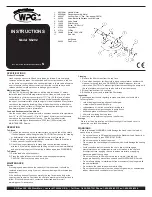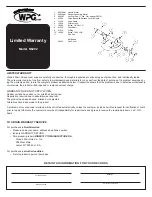
Rev. 0.0 / 07-20 Instruction Sheet 32610
N
INSTRUCTIONS
Model N6292
1. 90510AM Handle, Metal
2. 90520AM Plunger Assembly, Metal
3. 49646T Vacuum Pad, 11" Dia., Flat, Lipped (G3370)
4. 90500 Valve Block with Release Lever & Guard
5. 51506 Valve Guard
6. 15630 Filter Screen
7. 10002 Screw, 1/4-20 x 1/2"
8. 61552 Check Ball
9. 61514 O-Ring
10. 10008 Screw, 10-32 x 3/8"
11.
Red Line
Not Shown
29353 Pad Cover
SPECIFICATIONS
Product Description
Hand cups use vacuum to lift and carry loads, as follows: A manual pump
removes air from between the rubber pad and the contact surface; a red line
on the pump's plunger serves as a vacuum indicator; a check valve allows the
user to repump the cup without removing it from the contact surface; and a
release mechanism allows the cup to disengage completely.
Maximum Load Capacity
225 lbs [102 kg] per cup. Maximum Load Capacity includes a 3:1 safety
factor and requires the following: attachment on clean, smooth, nonporous
flat surfaces; a minimum vacuum level of 17½" Hg [-59 kPa]; and a friction
coefficient of 1. This rating is based on tests of new hand cups attached to
the upper, horizontal surface of static objects in ideal conditions. Many factors
can reduce the capacity, including: lifting a load when the cup is attached to
a vertical or inclined surface; or lifting a load that applies leverage to the cup.
See www.wpg.com for more information.
Load and Environmental Conditions
Use the cup on clean, relatively smooth, nonporous surfaces, at temperatures
from 10° to 120° Fahrenheit [-12° to 49° Celsius]. Moisture or contaminants
can reduce the slip resistance of the cup. The red-line indicator may
not perform reliably at elevations above 5000 feet [1524 meters]; see
MAINTENANCE: Service.
OPERATION
To Attach
1) Position the hand cup on the contact surface so the red line will be visible
if it should appear while lifting the load. CAUTION: Test the cup for staining
or deformation of load surfaces with light colors or soft coatings.
2) Pump the plunger until the cup attaches completely. When the red line is
hidden, vacuum is sufficient for lifting.
3) Check the plunger frequently to make sure the cup remains securely
attached. If the red line appears while lifting, set down the load immediately
and pump the plunger until the red line is hidden again (see WARNINGS).
To Release
1) Set the load on a secure support.
2) Press the valve release lever until the cup disengages completely.
CAUTION: Remove the cup when not in use.
MAINTENANCE
Service
Since aging and wear reduce the capacity of the rubber pad, it should be
replaced at least once every 2 years or whenever damage is discovered (see
Inspection).
If the hand cup does not function normally, the cup face may be dirty or the
cup may require service. First clean the cup face according to the directions to
follow. If the condition persists, contact an authorized dealer or visit
www.wpg.com for assistance.
Cleaning
1) Remove the filter screen from the cup face.
2) Use a clean sponge or lint-free cloth to apply soapy water or another mild
cleanser to the cup face; see WARNINGS and www.wpg.com for more
information. CAUTION: To prevent liquid from contaminating the pump, hold
the cup face-down or cover the suction hole in the screen recess.
3) Wipe all residue from the cup face.
4) Allow the cup to dry and reinstall the filter screen.
Inspection
Examine and test the cup regularly to make sure it does not exhibit the
following faults:
• cuts or damage to sealing edges of rubber pad.
• cracks or dents in handle or pump.
• reappearance of red line soon after attaching cup.
• sluggishness or dramatic changes in pump action.
• excessive glaze or stiffness of rubber pad.
• filter screen missing from cup face.
Correct any faults before using the cup (see Service).
Storage
Store in a clean, dry location out of direct sunlight. Use the pad cover to
protect the cup face from damage
WARNINGS
Failure to observe WARNINGS could damage the hand cup or the load, or
cause injury to the user.
• Do not use the cup to lift loads that exceed the Maximum Load Capacity or
the effective capacity (see SPECIFICATIONS).
• Do not use the cup to support a person.
• Do not place the cup face against surfaces which could damage the sealing
edges.
• Avoid conditions that could cause the cup to slip or to disengage
prematurely, such as: contaminants, cuts or scratches in the cup face
or contact surface; applying the cup to porous materials; or applying
pressure against the cup edge.
• Do not use the cup to lift when the red line is visible. If the red line
reappears frequently, discontinue use and see MAINTENANCE: Service.
• Do not allow anything to interfere with free movement of the plunger while
the cup is attached.
• Do not touch the valve release lever while lifting.
• Do not use harsh chemicals (such as solvents or gasoline) or unauthorized
rubber cleaners and conditioners to clean the cup.
P.O. Box 368 · 908 West Main | Laurel, MT 59044 U.S.A. | Toll Free: 1-800-548-7341 Phone: 1-406-628-8231 Fax: 1-406-628-8354



















